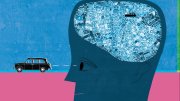London cabbies are famous for knowing their way around their city’s maze of streets. To obtain a taxi license in London, drivers must pass a legendary test requiring them to memorize the names and locations of 25,000 streets, as well as landmarks and businesses. Passing the exam demands years of intensive study.
This knowledge appears to affect the drivers’ brains, enlarging the hippocampus, an area responsible for spatial memory and navigation. According to a small brain-imaging study published in 2000, London cab drivers had unusually large hippocampi. This part of the brain also happens to degrade in people with Alzheimer’s disease.
With those findings in mind, four Harvard researchers recently conducted a new study, published in the BMJ (formerly known as the British Medical Journal), which explored rates of Alzheimer’s-related deaths among almost nine million people across 443 different occupations between 2020 and 2022.
“The two occupations with the lowest Alzheimer’s mortality are ambulance drivers and taxi drivers, jobs that very heavily use the hippocampus as a function of their everyday work,” explains Newhouse professor of healthcare policy Anupam Jena. He and his colleagues were startled by the strength of their results: ambulance drivers and taxi drivers were less than half as likely to die of Alzheimer’s disease than the general population.
Jena and his collaborators—Harvard Medical School clinical fellow in surgery Vishal Patel, Harvard medical student Michael Liu, and assistant professor of medicine Christopher Worsham—envisioned this project when the National Vital Statistics System, a registry that contains nearly all U.S. deaths, began including primary occupations with every record. “This cool new data had become available,” Jena explains, “and we were brainstorming what kind of questions we could ask of it.”
They decided to explore whether performing certain jobs might offer protection from Alzheimer’s disease, the most common form of dementia. Deaths attributed to Alzheimer’s have doubled during the past 30 years and will likely increase as baby boomers age.
Just 1 percent of taxi drivers and less than 1 percent of ambulance drivers died as a result of Alzheimer’s disease, compared with nearly 4 percent of people across all occupations. Jena emphasizes that the researchers did not include other ambulance personnel in their analysis, such as the paramedics who provide care to patients in ambulances, and focused instead on the people behind the wheel, rushing patients to medical care.
Interestingly, taxi drivers are not known for stellar health outcomes, Jena says. They typically have higher mortality rates compared with people in other occupations, making their very low Alzheimer’s rates especially remarkable. The researchers wondered if taxi drivers experience other factors that protect them against dementia more generally. In that case, the researchers would expect cab and ambulance drivers to be similarly protected from other types of dementia as well. But their analysis showed these drivers had ordinary rates of vascular dementia, which does not involve the hippocampus.
And the very low incidence of Alzheimer’s disease did not manifest among drivers of other modes of transportation, which involve “fewer navigational demands.” Another brain-imaging study of long-time London bus drivers found that they do not have enlarged hippocampi. Scientists suspect that this is because “bus drivers are driving predetermined routes,” says Jena. “It’s not this on-the-fly navigational memory that taxi drivers are required to possess.” He and his colleagues found that pilots and ship captains also exhibited typical rates of Alzheimer’s mortality.
So, might giving up GPS and deleting map apps strengthen one’s hippocampus and ward off Alzheimer’s disease? Jena says more research is needed and he is somewhat skeptical. “Most people spend a fraction of their day in the car compared to taxi drivers,” he explains. And most follow the same well-worn routes, which do not require them to consult mental maps. “It’s like saying that you could expect to derive the same benefits from walking half a mile a day as someone gets from running six miles a day.”
At the same time, walking a half-mile is better than not moving at all, Jena adds. Perhaps occasionally memorizing a route instead of relying on navigation apps could offer benefits: “It could be the case that very small differences in how we use the hippocampus as part of our daily lives could have small effects on later Alzheimer’s risk,” he says.
Given the prevalence of Alzheimer’s disease and its devastating impact, Jena hopes to see future randomized trials that test brain exercises or other interventions that “strengthen and maintain navigational memory to see if it has a protective effect,” he says. That could help, not by stopping the pathophysiology of Alzheimer’s, but perhaps by buffering the cognitive aspects of the disease.









